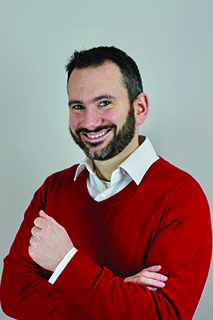Thinking of quitting an unhealthy habit or losing weight isn’t a great way to frame your goals. Rapid Change expert Howard Cooper explains why it’s better to move towards a goal rather than move away from a current bad habit.
Have you ever questioned what inspires you to exercise? Why do you revel in the spirit of adventure and the joy of pushing yourself to new boundaries? Is it the curiosity of seeing just what you’re capable of? Is it your desire to reach your full potential? Or is it simply that you can’t bear the thought of being unfit, unhealthy or getting old?
Take a moment with me now to consider the answers to these important questions. I ask you this because, at times in our lives, we can work hard on achieving our next physical challenge – and then we give ourselves a little pat on the back, we rest on our laurels and reward ourselves with a well-earned rest.
For example, maybe you’ve been training hard to complete a fitness challenge and you’re feeling tempted to take a break. Maybe your inner voice is whispering to you: ‘Hey, I reckon I’ve earned a rest after plodding through all this rain!’ Then, once you’ve eased up, what also happens is that you switch off from considering new challenges.
Clear-headed outlook on your goals
What if that isn’t the best thing to do? Let’s return to my opening question, because the way you answered it may offer you an insight into becoming more grounded, being clearer in your goal setting. Firstly, what exactly do I mean by being ‘grounded’?
This word is often used to describe being clear-headed, with a lack of over-thinking and a sense of being present in the moment. And yes, you are likely to have greater mental clarity from this internal place and the decisions and goals made from this state are likely to be better.
However, being ‘grounded’ also implies strong foundations supporting the whole system. Think about foundations under a building (deep in the ‘ground’) keeping that building structurally sound.
Imagine roots beneath a plant, providing it support physically and nutritionally, literally ‘grounding’ the plant firmly in place. Now please indulge me while I share a personal story which may explain how being truly grounded can help you set better goals and achieve more. Many years ago, when I tipped my bathroom scales four and half stone heavier than I am today, my weight and fitness had always ‘Yo-Yo’-ed. There were periods where I was “on it”, getting fitter and slimmer. There were times when I did no exercise at all and ate far too much. Why was my motivation fluctuating so much? Was it because my roots didn’t support the system? Perhaps I wasn’t grounded.
Why do we yo-yo with our ambitions?
I became fascinated with trying to understand why this ‘Yo-Yo’-ing happened – why I sometimes felt unstoppable; other times, ‘I felt like I just couldn’t get started. What I discovered about my own thinking shed a huge light on this. I remember at one of my heaviest moments suddenly deciding: ‘Enough is enough!’ and that I would ‘lose weight and get fit’. I caught myself thinking: ‘I just don’t want to be fat and unfit’.
This catapulted me into action. I started losing weight and exercising more. However, here is the interesting thing: I started to achieve it. Suddenly, I looked in the mirror and because I’d lost weight and felt fitter (and now further away from my, ‘I might be fat and unfit’ thought), my motivation waned.
It was as though I needed the ‘fear of being fat and unfit’ to be close enough to generate enough motivation to action it. Psychologically speaking, I was not moving towards health and fitness – I was moving away from being unhealthy. This is a very different thing. And much more unstable ‘ground’ to be operating from.
Moving away from something unpleasant isn’t, of course, a ‘grounded’ and stable place to achieve your goals in the long term. But having goals you are ‘moving towards’ offers much stronger, long-term foundations.
To achieve weight loss, I switched focus to move towards fitness and health. This ‘more grounded’ goal would not fade as I lost weight, but instead kept driving me forwards to set new, ever-increasing challenges.
Practical challenges of reaching your goals
So, for you, what does this mean in practical terms? Let’s return to my opening question one more time and try to remember exactly how you answered it. Was your goal a ‘moving away from something unpleasant’ goal (i.e. ‘I wanted to do the marathon so that I won’t end up unfit and unhealthy.’)?
Or, was it a goal more grounded in helping you ‘move forwards positively’? (i.e. ‘I’m curious about just how fit, healthy and physically capable I can become.’). Now some people struggle to work out whether they are looking at goals in a ‘moving away from’ or a ‘moving towards’ way. So, here’s an alternative strategy for calculating this key information. It may help you identify this all-important focus. Think of one goal you recently set yourself (like deciding to complete a spring marathon). Instead of asking yourself: ‘Why did I want to run the marathon?’, tweak the question, crank it up a bit. Ask yourself: ‘What would completing the marathon mean for me?’ This subtly different question will help you connect with your deeper reasons for doing it. Now you’re illuminating whether you are ‘moving away’ from something or ‘moving towards’ it.
I recently asked a client: ‘If you completed a marathon, what would that mean to you?’. He replied it would mean he knew he ‘was fit, strong, healthy with his body and mind in great condition’. For him, his motivator wasn’t about the marathon itself. It was a broader, more grounded goal about keeping himself ‘fit, strong and healthy in body and mind’. This more grounded focus helps people achieve much more in the longer term. And that’s why really understanding the answer to my opening question (‘Why are you interested in outdoor fitness and adventure pursuits at all?’) is so crucial to building your future success.
Seriously, think about it: If your goal was to complete a spring marathon – and that was it – then what would happen when you crossed the finish line? Answer: You’d pick up your medal. Job done. Shoes off. Back to resting on your laurels. But what if you began to understand your goal was greater than that? What if the roots that supported you led to a bigger goal – to explore the limits of your physical potential for the rest of your life?
Wouldn’t that wider root system boost the way you interacted with the world more profoundly? I invite you to give it a try. I hope you’ll find it an enriching challenge to connect with a wider goal and strengthen the grounding on which you build your psychological foundations.
Five Steps To Connect With A More Grounded Goal
Test your mental fitness and try following these simple steps.
- Ask yourself: ‘If I achieve my next goal, what would that mean to me?’
- Consider: ‘Why am I interested in fitness at all?’
- Reflect on this: ‘Beyond my next goal, what are my ultimate health, fitness and adventure goals?’
- Asking these three questions will help you connect with at least one powerful ‘moving towards goal’ (maybe three!)
- Take time regularly to focus on your “grounded” ‘moving towards goals’ in order to achieve more.
More Information on Howard Cooper

Photo: Elizabeth Benjamin
Howard Cooper is one of Britain’s leading ‘Rapid Change’ experts. A qualified hypnotherapist and Master Practitioner in Neuro-Linguistic Programming (NLP), he’s spent the past 17 years helping people create rapid shifts in their thinking. For more details of his work, visit Rapid Change Works







